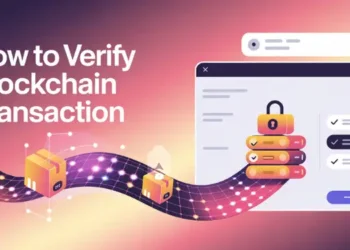The digital ledger revolution waits for no one. Cryptocurrency and decentralized systems are changing our economy, and understanding them requires the right education.
You don’t need a computer science degree to learn blockchain or own digital assets. 68% of crypto pros started without coding. They learned blockchain fundamentals through courses.
“Understanding blockchain is easier than most people think—especially when taught in digestible steps,” I tell my students. “It’s about understanding one block at a time.”
I started with simple drawings and lots of questions. Now, after eight years, I’ve helped thousands. I teach blockchain basics in a way that’s easy for everyone.
There are many learning options for absolute beginners. You can find free online courses or university certifications. The best choice depends on your goals and learning style.
Before you start, think about what you want to achieve. Define your learning goals early—it helps you choose the right course and stay motivated. This will help you pick the right course.
- Quality blockchain courses for beginners require no prior technical knowledge.
- Structured learning prevents common newcomer mistakes
- Different program types serve different career and knowledge goals
- Consistent, small steps lead to genuine expertise regardless of background
Free introductory blockchain courses for tight budgets
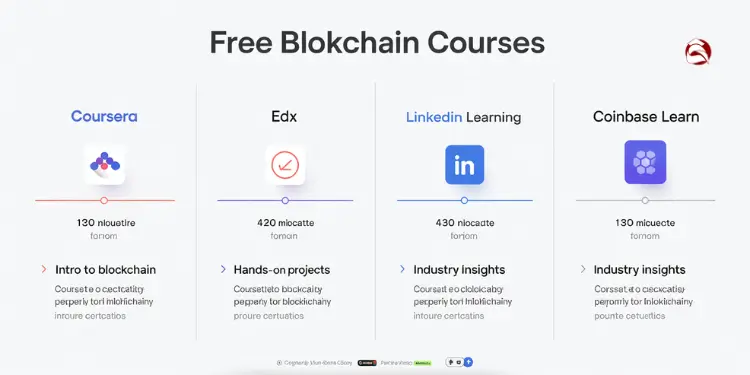
Learning blockchain on a budget is possible thanks to free, high-quality resources. There are many free resources out there. Not everyone can spend much money, but you can learn a lot for free.
I was curious about blockchain but didn’t want to spend much money. So, I looked for free courses. I found many good ones that taught me the basics.
Most academic MOOCs, including Buffalo’s blockchain series, require at least basic programming knowledge for development-oriented modules—true beginner learners may face steep learning in technical tracks. Ref.: “Blockchain Basics – Coursera” (University at Buffalo). [!]
“The best investment I made in my blockchain journey was starting with free courses. They gave me enough understanding to determine where I wanted to specialize before spending a dime.”
Truly Free vs. “Freemium” Learning Options
Watch out for ‘freemium’ models that appear free but lock key content behind a paywall. Some courses seem free but then ask for money for extra stuff. I’ve picked courses that are really free and worth it.
When looking for free blockchain courses, I check a few things. They need to cover a lot of material, have good teachers, and keep up with new tech. Here are some free courses that meet these standards.
Top Free Blockchain Courses Worth Your Time
- Blockchain Basics by University at Buffalo (Coursera) – A four-week intro that takes 3-5 hours a week. No tech skills needed. You’ll learn about blockchain and how it works.
- Blockchain Fundamentals by Berkeley (edX) – A two-month course on crypto and smart contracts. It has practical exercises to help you understand.
- Introduction to Cryptocurrencies and Blockchain (LinkedIn Learning) – A quick 2-hour course for beginners. It covers the basics in a simple way.
- Blockchain Theory 101 (Coinbase Learn) – A self-paced course with short lessons. It explains blockchain and crypto basics with easy-to-understand visuals.
| Course Name | Time Commitment | Prerequisites | Certificate Offered | Best For |
|---|---|---|---|---|
| Blockchain Basics (Coursera) | 16-20 hours total | None | Yes (audit option available) | Conceptual learners |
| Blockchain Fundamentals (edX) | 24-30 hours total | Basic computer literacy | Yes (audit option available) | Technical beginners |
| Intro to Cryptocurrencies (LinkedIn) | 2 hours total | None | Yes (with trial) | Business professionals |
| Blockchain Theory 101 (Coinbase) | 4-6 hours total | None | No | Crypto-curious beginners |
Making the Most of Free Resources
Free courses won’t give you as much as paid ones, but they’re a good start. They help you understand blockchain basics. This knowledge lets you join in on blockchain talks and see what interests you.
Look for courses from universities on platforms like edX and Coursera. They’re made by experts and updated often. Even without paying, they offer great learning value.
Free courses may offer certificates—great for resumes, even if not formally accredited. These aren’t formal certifications but show you’ve learned something. They’re good for your resume while you explore blockchain.
Are you ready to start? Pick a free course and do the first module this week. Start small and build up your knowledge.
University accredited programs awarding blockchain certificates
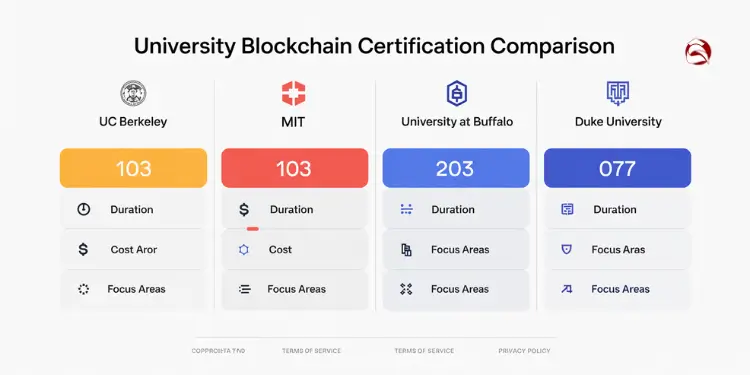
University programs are a great choice for those wanting to prove their blockchain skills. They provide accredited credentials recognized by universities or the blockchain industry. This is more than just a digital badge; it’s a big step in your blockchain career.
It’s important to know the difference between a “certificate of completion” and an “accredited certification.” The first just shows you finished a course. The second is recognized by schools or the industry. This makes a big difference on your resume.
University blockchain programs teach both theory and practice. They help you understand blockchain well and use it in real jobs. These programs work with industry leaders to keep their lessons up-to-date.
“University certification programs bridge the gap between academic blockchain theory and practical industry application. They provide a structured framework that helps professionals develop both depth and breadth in their blockchain knowledge.”
Many top schools now offer blockchain certification programs. Here are a few to consider:
| Institution | Program Name | Duration | Cost Range | Focus Areas |
|---|---|---|---|---|
| UC Berkeley | Blockchain Fundamentals Professional Certificate | 3-6 months | $198-$597 | Cryptography, Consensus Mechanisms, DApps |
| MIT | Blockchain Technologies Certification | 6 weeks | $2,800 | Business Strategy, Implementation, Governance |
| University at Buffalo | Certified Blockchain Professional | 4 months | $3,500 | Enterprise Solutions, Smart Contracts, Security |
| Duke University | Blockchain Specialization | 3 months | $49/month (Coursera) | Decentralized Finance, Tokenomics, Regulation |
In my eight years teaching blockchain, I’ve seen a big difference. University-trained people solve problems in a systematic way. They have a broad understanding. Self-taught experts are quick and agile.
These programs cost a lot. They’re worth it if you need a formal degree for your job, changing careers, or if your employer pays for it. Think about how much you’ll earn after getting certified.
“Learn More About: Key Components of Blockchain Explained in Simple Terms“
Curriculum Depth Assessed by Industry Professionals
What makes university blockchain certifications special is their curriculum. It’s not just made by one person. It’s reviewed by both school committees and industry experts.
Good programs work with the industry to make their lessons relevant. For example, UC Berkeley works with the Blockchain at Berkeley group and industry partners. This ensures their lessons tackle real-world problems.
Industry experts look at these programs in several ways:
- Technical depth in cryptography and consensus
- Learning about different blockchain platforms
- Real-world case studies and challenges
- Learning about governance and rules
- Hands-on projects to show skills
When looking at a certified blockchain program, check who made the curriculum. Programs with clear industry advisors are more likely to be up-to-date.
The best blockchain professional certifications have capstone projects. These projects are checked by real professionals. They show you can solve real business problems.
Getting certified in blockchain is different from other fields. While some programs are accredited by universities, industry recognition is key. Look for programs supported by groups like the Blockchain Education Network or Hyperledger Foundation.
Before choosing a program, find a graduate on LinkedIn. They can tell you about their experience. Ask them about their journey and how it helped their career.
“Check This Out: Best Blockchain Books for Beginners to Demystify Crypto Tech“
Hands on bootcamps teaching smart contract development
Blockchain development bootcamps let you dive into code. They focus on skills to bring blockchain ideas to life. In my classroom, students often have big moments when they make their first smart contract.
Good bootcamps mix teaching with doing. They aim for a 30/70 split. Look for at least 20 hours of coding each week. Ensure you are familiar with the fundamentals of programming.
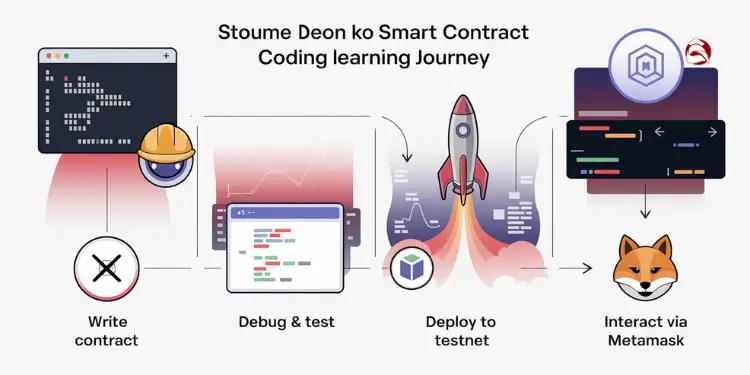
Crypto bootcamp programs typically span under six months and focus heavily on practical coding, smart contracts, and platforms like Ethereum—compared to 2–4‑year associate/bachelor degrees. Ref.: “Best Crypto Bootcamps.” ComputerScience.org. [!]
Build Decentralized Apps in Guided Projects
Learning through projects is key in bootcamps. You build real apps, not just practice exercises.
Start with simple projects like making tokens. Then, move to more complex apps. The Cyfrin Solidity course is a great example.
A graphic designer with little coding experience found success in a bootcamp. She made an NFT marketplace in weeks. Seeing her code work was a big moment for her.
“I understood blockchain intellectually, but couldn’t apply it until I actually built something. Watching my first smart contract execute on a testnet was like turning on a light switch.”
“For More Information: What is Blockchain Technology in Simple Terms for Beginners“
Debug Solidity Code with Live Mentors
Writing code is just part of bootcamps. Fixing it is also key. Mentors are very helpful during debugging.
Good bootcamps offer regular debugging sessions. They should have experienced developers to help. Look for at least two sessions a week.
Debugging teaches you a lot. It helps you write better code. Ask about the mentor-to-student ratio when choosing a bootcamp.
Deploy Contracts Safely on Test Networks
Learning to deploy contracts safely is important. Quality programs teach this on test networks first.
Good bootcamps teach you to test and secure your contracts. You’ll learn to use tools like Hardhat. This builds your confidence.
Try deploying the same contract to different test networks. This shows you the real-world differences. It’s a hands-on lesson.
Before picking a bootcamp, check if it covers modern security practices. The blockchain world changes fast. Choose programs updated recently.
Want to start? Download MetaMask and do a transaction on Sepolia. It’s a practical first step before diving into development.
“Explore More: Blockchain Explained for Beginners in Plain English“
Business oriented courses demystifying enterprise blockchains
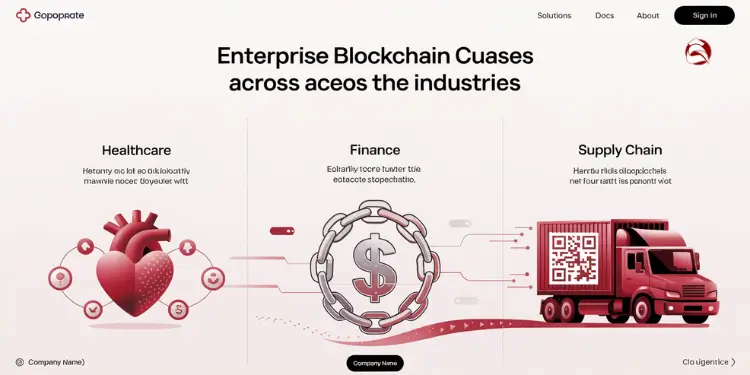
Business courses make blockchain easy for professionals. They focus on using blockchain, not just coding. This helps executives see how blockchain adds value to their work.
When I work with businesses, I see a big gap. Tech teams and business teams often don’t talk the same language. Good courses help everyone understand blockchain’s possibilities.
Enterprise blockchain is different from public networks like Bitcoin. Courses highlight these differences. They teach about permission, consensus, and governance that matter to businesses.
Executive Programs Worth Your Investment
When looking at blockchain courses, don’t just look at the buzzwords. Good programs give you real tools, not just hype. Here are some top programs:
- MIT Sloan Executive Blockchain Program – Great for top executives to learn blockchain basics
- INSEAD Blockchain Revolution for Enterprise – Focuses on changing your business and models
- Columbia Business School Blockchain Programs – Shows how blockchain works in finance, healthcare, and supply chain
- Oxford Blockchain Strategy Programme – Teaches about governance and how to start
These programs teach blockchain without coding. They focus on how to use it, find good uses, and measure success.
Industry-Specific Applications
Blockchain affects different areas in different ways. Good courses tailor their lessons to specific industries:
| Industry | Key Blockchain Applications | Business Considerations | Recommended Course Focus |
|---|---|---|---|
| Financial Services | Settlement systems, KYC/AML, trade finance | Regulatory compliance, interoperability | Governance models, consortium design |
| Supply Chain | Provenance tracking, inventory management | Partner onboarding, standards adoption | Multi-party workflows, IoT integration |
| Healthcare | Patient records, clinical trials, credentialing | Privacy regulations, data sovereignty | Zero-knowledge proofs, consent management |
| Real Estate | Title transfers, property management | Legacy system integration, legal frameworks | Smart contracts, digital asset representation |
When looking at blockchain for your field, find courses that focus on your area. Look for real examples and experienced teachers.
Bridging Technical and Business Understanding
Learning about blockchain helps you talk to tech teams. Knowing the basics lets you ask better questions and check proposals.
Good courses teach you to spot real innovation. You learn what matters for business and what’s just tech details.
“The most successful enterprise blockchain implementations happen when business leaders understand enough about the technology to set clear objectives, while respecting the expertise of their technical teams to determine how to achieve those objectives.”
Blockchain is a powerful tool for business change. But it only works for the right problems. Good courses teach you which problems blockchain solves best.
Practical Next Steps
Before you start learning, think about a trust or verification problem in your business. Imagine how blockchain could solve it. Bring this idea to your learning.
This makes your learning practical and useful. It helps you see if a course really adds value or just talks about it.
Understanding blockchain isn’t about being a tech expert. It’s about knowing enough to make smart choices and talk to your tech team.
“Related Articles: How to Start a Blockchain Career: Breaking into the Industry“
Self paced learning paths with community support
Busy professionals can learn blockchain at their own pace. Many are learning while working or taking care of family. You don’t have to learn alone.
Learning on your own needs motivation and help from others. Studies show that setting goals and talking to others helps a lot. Look for places that offer both freedom and support.
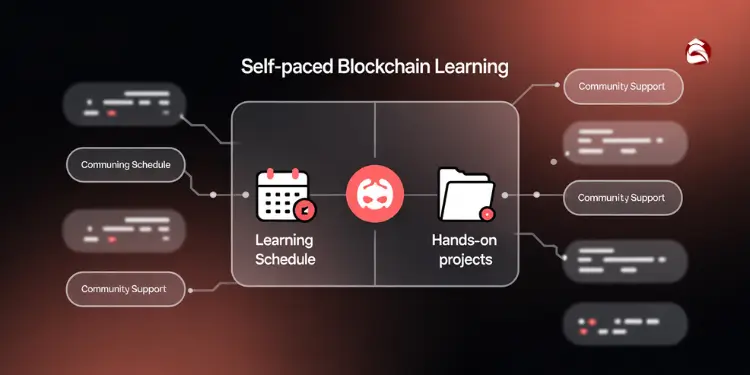
Top Platforms Balancing Independence With Support
Some platforms do a great job of balancing freedom and community:
- Codecademy’s Blockchain Path – Has weekly challenges and forums for sharing. It teaches you to code while you connect with others.
- LinkedIn Learning – Offers courses with Q&A sections. Instructors answer quickly, and comments can start communities.
- Educative.io – Has interactive modules and Discord channels. It’s easy to learn without getting tired of videos.
- Udemy Blockchain Courses – Many have active discussion boards. Look for courses with lots of recent questions and answers.
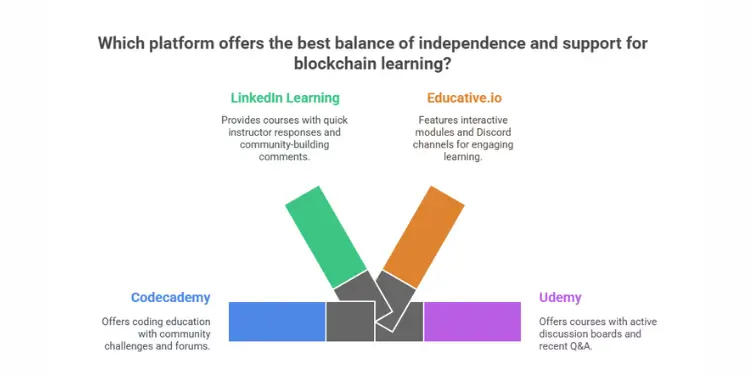
I struggled with learning alone until I found a study group. We met every Thursday to share and stay motivated. This made learning fun and flexible.
“You Might Also Like: How to Get into Blockchain: Entry Tips for Beginners“
Creating Accountability Without Deadlines
When you’re learning on your own, you need to stay on track. Here are some ways to do that:
- Find someone learning the same thing and meet weekly
- Use commitment contracts to stay motivated
- Post updates on a blockchain Discord server
- Set aside time just for learning blockchain
Blockchain changes fast, so make sure your learning materials are up-to-date. Good courses show when they were last updated.
Passive watching won’t get you far—apply what you learn with small, real-world projects. Make sure you practice what you learn. Try building something or analyzing a blockchain.
“The blockchain community is uniquely collaborative because the technology itself is built on distributed consensus. Finding your tribe within this ecosystem isn’t just helpful—it’s essential to truly understanding the technology’s [link].”
Many feel like impostors in blockchain because it’s so complex. But even experts keep learning and asking questions. It’s okay to specialize.
There are always new things to learn in blockchain. Focus on the basics first, then pick what interests you most.
Your action step for this week: Join a blockchain community. Say hello and ask a question. See how fast you get help and start building your network.
Top rated 2025 courses for absolute beginners
The world of blockchain is always changing. New rules and security steps come up often. For newbies, it’s key to learn from the latest stuff.
Top courses in 2025 keep up with new rules. Cyfrin’s smart contract course, updated on March 26, 2025, shows the newest Ethereum tips. These are new ideas from 2024.
“Read More:
Latest Course Updates Reflecting Regulatory Changes
Learning the latest is very important in blockchain. Old lessons can lead to mistakes. Good courses now include:
- New info on crypto rules across borders
- Hands-on labs with the newest tools
- Stories about recent security problems
- Lessons on making things work faster
Ensuring content is current is critical—courses updated after March 2025 are essential to include recent developments in on‑chain regulations, Ethereum updates, and toolchain changes. Ref.: “Best Blockchain Courses… Coursera” (2025). [!]
Before picking a course, check when it was last updated. In the blockchain world, old news is not helpful. Starting your blockchain journey means learning the latest.
Choose teachers who talk about new rules and keep their updates clear. The best courses teach more than just coding. They get you ready for real-world blockchain challenges.












